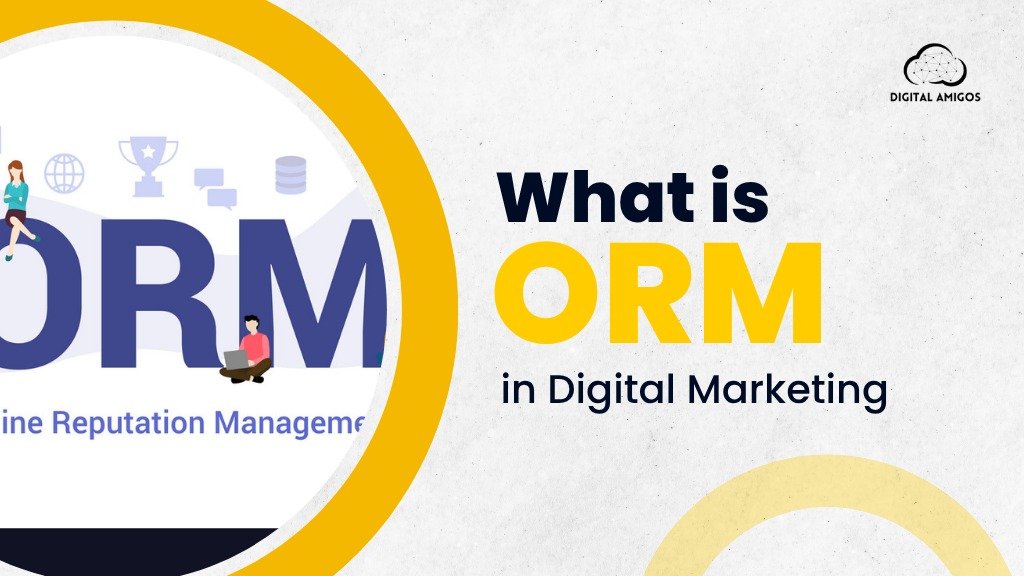What is ORM in Digital Marketing? Role, Benefits & Strategies Explained
In today’s digital-first world, your online image is your brand’s reality. Whether you’re a startup, a local business, or an established brand, people are talking about you—on search engines, review sites, and social media platforms. The question is: are you listening, and are you responding?
This is where Online Reputation Management (ORM) comes in.
In this blog, we’ll explain what ORM is in digital marketing, why it’s important, how it works, and what strategies businesses can use to manage their online image effectively. We’ll also look at tools, real-world examples, and common questions people ask about ORM.
What is ORM in Digital Marketing?
Online Reputation Management (ORM) is the practice of shaping how people perceive your brand online. It involves monitoring online conversations, managing online reviews, responding to customer feedback, addressing misinformation or negative press, and promoting positive content.
In simple terms, ORM is digital brand management.
Unlike traditional PR, ORM happens in real time. It’s not about what you say about your brand, it’s about what others say—and how you respond.
Key Functions of ORM:
- Monitor brand mentions across platforms
- Respond to negative or fake reviews
- Promote positive content to push down negative links
- Track customer sentiment in real-time
Why is ORM Important in Digital Marketing?
The role of ORM in digital marketing goes beyond just cleaning up bad press. It helps build lasting trust, improves conversions, and supports customer retention.
Why It Matters:
- 93% of consumers read online reviews before buying.
- 4 out of 5 people trust online reviews as much as personal recommendations.
- A single negative result on Google’s first page can reduce conversions by 20%–30%.
- Brands with excellent reputations get more sales, media mentions, and talent.
A positive online reputation helps:
- Increase customer confidence
- Support your digital marketing and SEO efforts
- Improve brand image and authority
- Reduce churn and customer complaints
What Happens Without ORM?
- Unchecked negative reviews damage trust
- Angry customers dominate the conversation
- Misleading news or fake reviews go viral
- You lose control over your brand narrative
ORM is an ongoing process that involves four major stages:
How Does ORM Work?
1️. Monitoring
Track what people are saying about your brand across platforms:
- Google results
- Social media mentions
- Review websites
- News articles and blogs
Tools like Google Alerts, Brand24, Mention, and Talkwalker can help you stay updated in real-time.
2️. Analysis
Understand the tone (positive, negative, neutral) and identify common issues. Look for:
- Frequently used words in reviews
- User pain points
- Recurring complaints or praise
3️. Response
Reply to feedback—especially negative reviews—in a polite, professional tone. Show that you care, provide solutions, and invite further contact offline.
4️. Recovery and Promotion
Once the issue is addressed:
- Push positive content (blogs, testimonials, case studies)
- Optimize brand pages for SEO
- Encourage happy customers to leave reviews
- Collaborate with influencers or thought leaders
Social Media & ORM: A Powerful Combination
Social media platforms are integral to ORM strategies. They serve as channels for customer feedback, brand promotion, and crisis management.
- Monitoring brand mentions using tools like Hootsuite, Brandwatch, or Mention.
- Responding to comments, DMs, and complaints — timely responses show customers you care.
- Handling trolls or negative publicity calmly and strategically.
- Amplifying positive content — sharing customer success stories, video testimonials, or influencer content.
- Running reputation-driven campaigns — such as social responsibility posts or community engagement activities.
Key Benefits of ORM for Businesses
ORM doesn’t just protect you from damage; it actively improves your online presence.
Benefits Include:
✅ Enhanced Brand Credibility
When your business responds professionally to reviews and mentions, it builds trust—even if the review was negative.
✅ Better Conversions
People are more likely to choose a brand with a 4.5-star rating and timely responses over one with no presence or lots of bad reviews.
✅ Stronger SEO
Google rewards fresh, positive content and high engagement. ORM indirectly supports SEO by cleaning your brand’s search result page.
✅ Effective Crisis Management
ORM allows you to act fast during PR disasters—containing misinformation, apologizing, and fixing issues before they escalate.
✅ Improved Customer Relationships
Acknowledging and acting on feedback shows you care. Customers feel valued and are more likely to remain loyal.
Effective ORM Strategies for Digital Marketers
Here’s how businesses can proactively manage and improve their reputation online:
1. Monitor Brand Mentions Constantly
Use tools like:
- Google Alerts (free)
- Brand24 (premium)
- Mention (real-time social tracking)
2. Respond Promptly and Politely
Never ignore a review—positive or negative. Acknowledge feedback, thank the reviewer, and offer solutions where needed.
3. Ask Happy Customers for Reviews
Make it part of your post-purchase flow to ask satisfied customers for feedback. It boosts your rating and balances out occasional bad reviews.
4. Create Positive Content
Publish blog posts, success stories, influencer reviews, interviews, or videos that reinforce your brand values and performance.
5. Address Criticism Honestly
If someone complains, own up to it and take steps to correct the problem. Avoid generic or automated responses.
6. Train Your Team
Ensure everyone representing your brand online follows consistent messaging, brand tone, and response etiquette.
Popular Tools for Online Reputation Management
| Tool | Best For | Features |
| Google Alerts | Basic mention tracking | Free, easy to set up |
| Brand24 | In-depth ORM | Social and web mentions, sentiment analysis |
| Mention | Social listening | Monitor across platforms, real-time alerts |
| Reputation.com | Enterprise ORM | All-in-one platform, review monitoring |
| Trustpilot | Review collection | Automated review requests, SEO-friendly display |
| Hootsuite | Social management | Schedule posts, reply from one dashboard |
Final Thoughts: Managing Your Brand’s Digital Image
ORM isn’t a luxury—it’s a necessity in the digital age.
When people search for your brand online, what they find should reflect your best version. Proactively managing reviews, listening to feedback, and sharing authentic stories help you build a solid, trustworthy reputation that brings long-term success.
Whether you’re a digital marketer or a business owner, mastering Online Reputation Management is key to winning hearts—and customers—in the digital marketplace.








